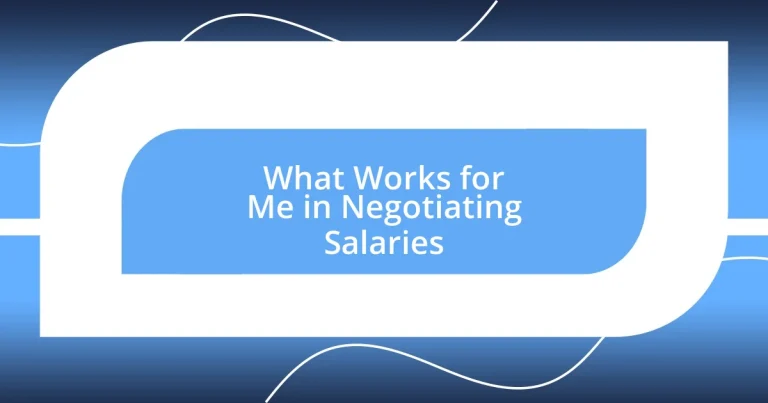Key takeaways:
- Preparation is crucial: Research industry salary trends and know your worth to boost confidence in negotiations.
- Practice makes perfect: Role-playing and reviewing your negotiation delivery can significantly enhance performance.
- Closing matters: Summarize key points agreed upon and express gratitude to foster a positive conclusion to negotiations.
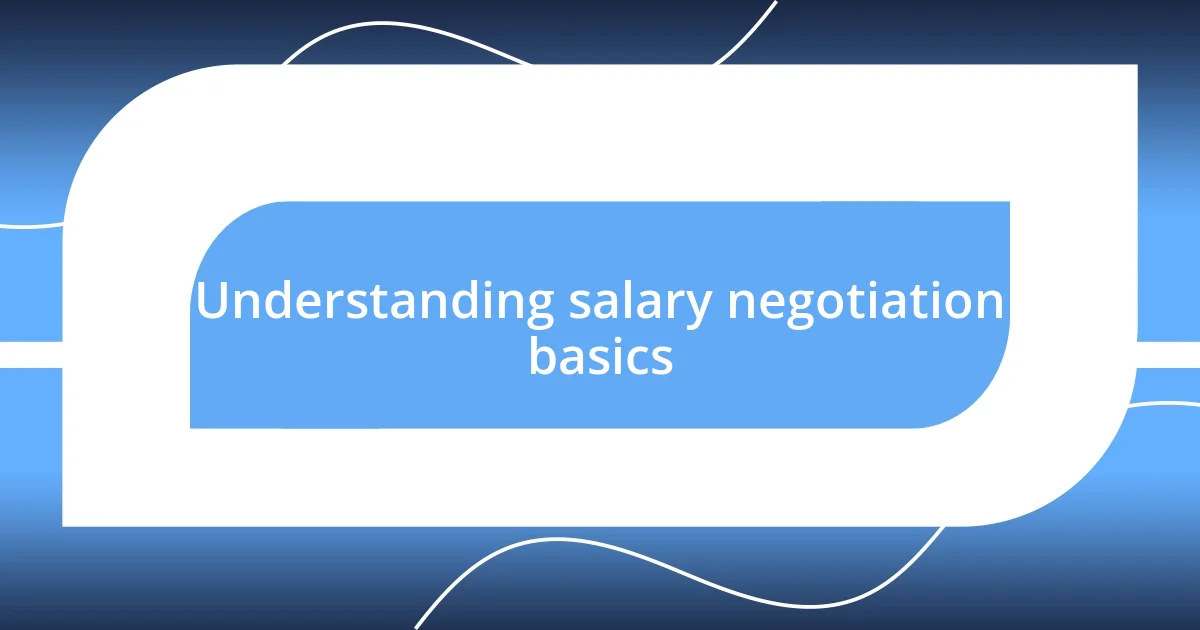
Understanding salary negotiation basics
When I first navigated the world of salary negotiations, I realized that understanding the basics is crucial. It’s not just about asking for a higher paycheck, but rather it’s about knowing your worth and being prepared to articulate it. Have you ever felt that knot in your stomach when discussing numbers? I certainly have, and it truly underscores how important preparation is.
A significant element of successful negotiation is doing your homework. I remember researching industry standards and what others in my position were making—it felt empowering to see my value reflected in numbers. This knowledge gave me the confidence to back up my requests during conversations. What’s your go-to strategy for demonstrating your worth to potential employers?
Lastly, remember that negotiation is a conversation, not a confrontation. It’s about finding common ground and creating a win-win scenario. When I learned to approach negotiations with a collaborative mindset, it transformed my experience. Have you ever thought about how the way you frame your request can shape the outcome? Building rapport and being open to feedback can make all the difference.
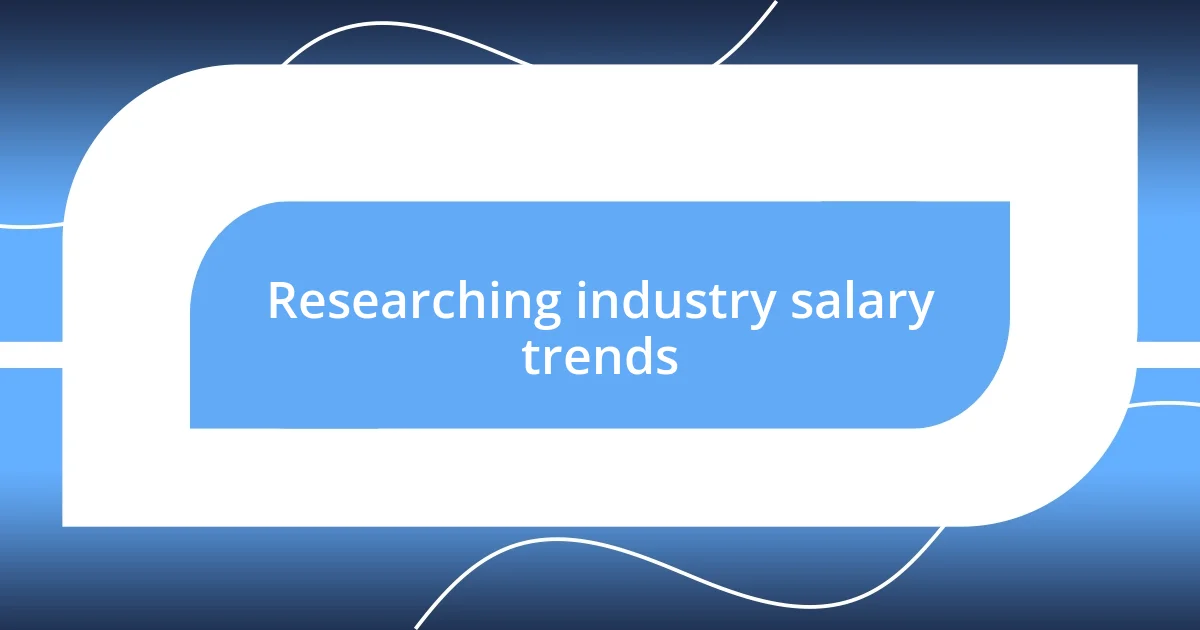
Researching industry salary trends
One of the first steps I take in salary negotiations is researching industry salary trends. It’s fascinating how this information can shift the entire conversation. For instance, last year, I found reports indicating that the average salary for my role had increased by 10% due to demand in the tech sector. Armed with that insight, I felt confident discussing a salary raise, knowing I was aligned with current trends rather than outdated perceptions.
To effectively research salary trends, consider these tips:
– Utilize reputable salary comparison websites like Glassdoor and Payscale.
– Explore industry reports and compensation studies specific to your field.
– Network with professionals in similar positions to gather anecdotal insights.
– Attend industry conferences or webinars where salary discussions may occur.
– Join online forums or professional groups where salary topics are a regular focus.
Finding this kind of data can be a game-changer. The more I learn about what others are earning, the more equipped I feel when discussing my own value.
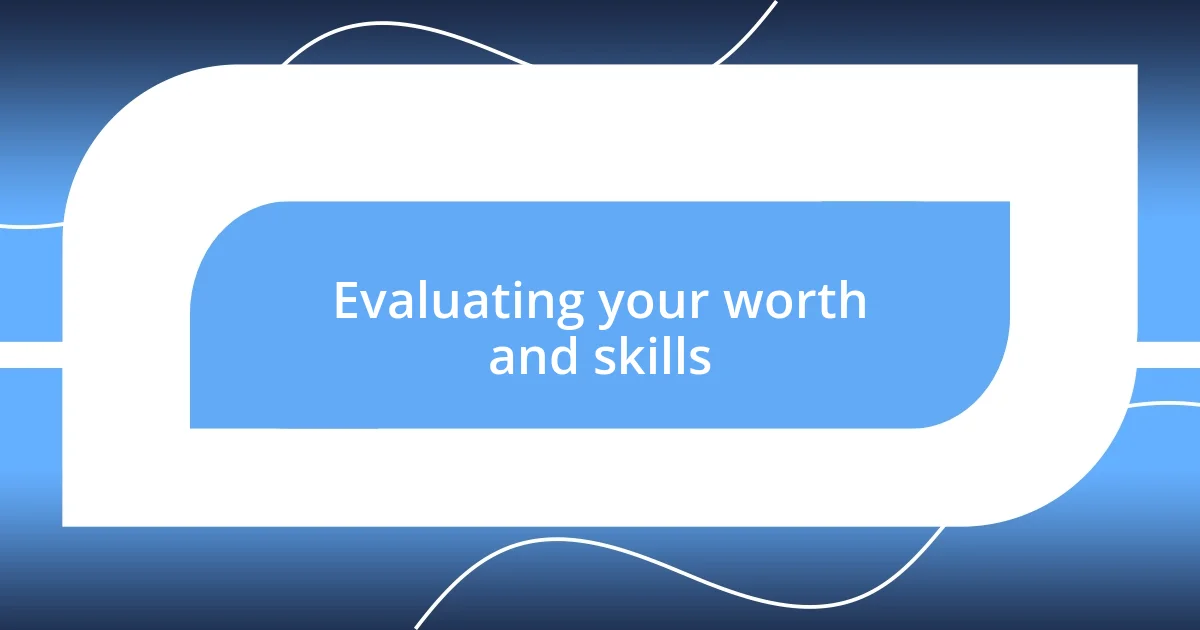
Evaluating your worth and skills
Evaluating your worth is a mix of objective data and personal reflection. I often create a list of my skills, achievements, and experiences, then assess how they compare to what’s in demand in my industry. For example, when I successfully led a project that increased our department’s efficiency by 20%, I realized that such tangible contributions bolstered my negotiating stance. Can you think of a similar situation in your career where your contributions directly impacted your organization?
It’s also important to reflect on the unique value you bring to the table. Everyone offers different perspectives and skills. When I transitioned into a new field, I leaned heavily on my previous experience in project management, which allowed me to bring organization and strategic thinking to my new role. This combination of skills made me a more attractive candidate, and acknowledging that worth made it easier to negotiate effectively. What skills do you possess that set you apart in your field?
Finally, don’t underestimate the power of self-confidence when negotiating. I remember doubting my worth after receiving feedback on a project I led, feeling that I could have done better. Yet, when I took a step back and reassessed what I had accomplished, I felt a surge of confidence. Recognizing my achievements not only changed my mindset but also enabled me to advocate for a salary that truly reflected my contributions. How do you remind yourself of your worth in challenging situations?
| Factors | Details |
|---|---|
| Skills | Specific abilities related to your job or industry. |
| Achievements | Concrete examples of how you’ve added value to previous roles. |
| Industry Standards | Current salary trends and averages for your role. |
| Unique Value | What makes you stand out from other candidates. |
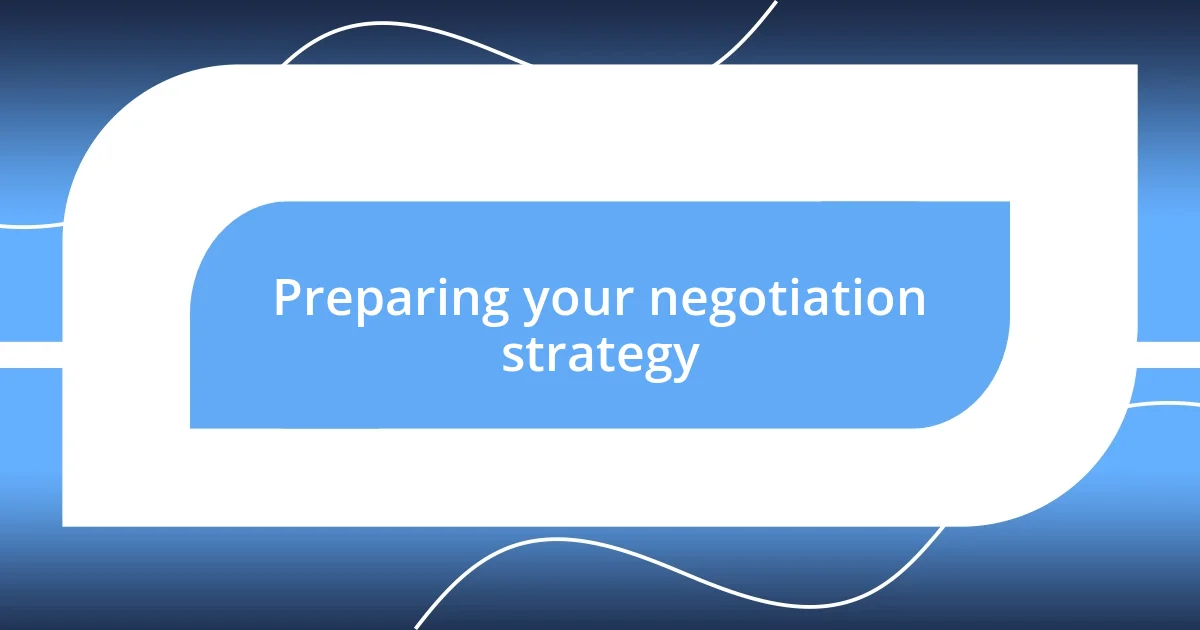
Preparing your negotiation strategy
When preparing my negotiation strategy, I find that it’s essential to define clear goals ahead of time. This clarity gives me direction during the conversation. For instance, during my last salary negotiation, I mapped out not just the salary I wanted but also benefits and professional development opportunities. Taking the time to consider what I truly valued helped me stay focused and assertive.
Next, I like to practice my negotiation delivery. It might feel a bit awkward at first, but rehearsing with a friend or even in front of a mirror has made a significant difference for me. I remember one time, after role-playing a negotiation scenario, I caught myself smiling and using a more assertive tone, which made me realize I deserved to advocate for my worth. How do you prepare to express your value confidently?
Lastly, I always keep in mind that questions can be powerful tools during negotiations. For example, I tend to ask open-ended questions to understand the employer’s perspective better. This approach not only opens up a dialogue but also makes it easier for me to gauge how flexible they are when it comes to meeting my requests. Reflecting on how I framed my inquiries, I found that showing genuine curiosity about the company’s future goals led to a richer discussion that worked out in my favor. What questions could you ask to uncover valuable insights during your negotiation?
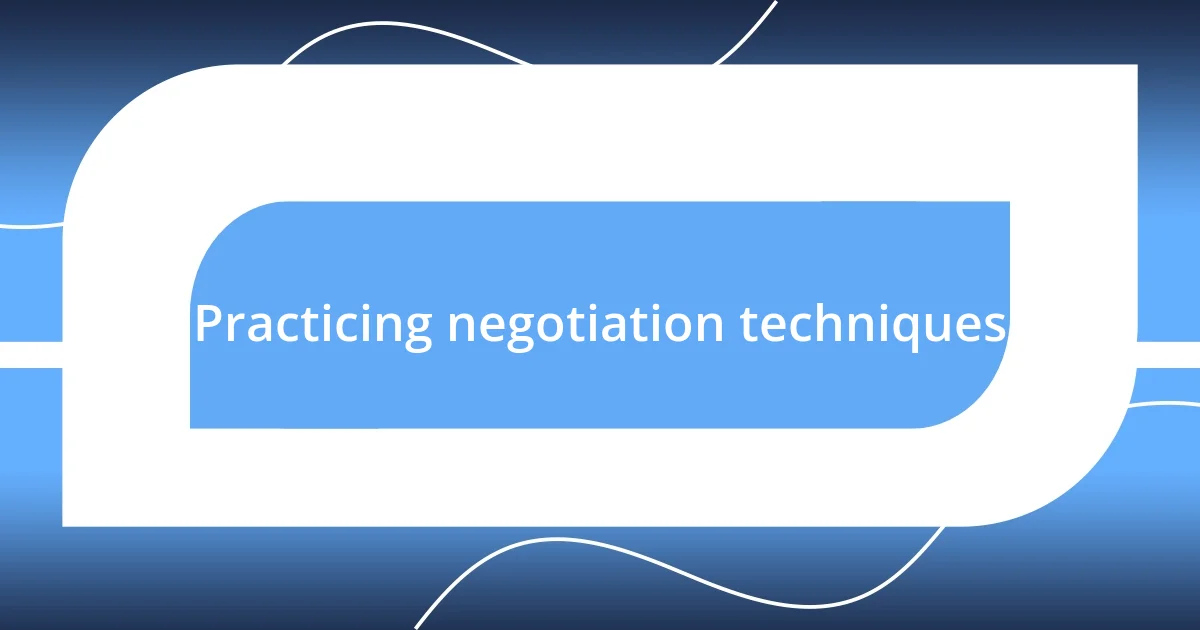
Practicing negotiation techniques
Practicing negotiation techniques is something I genuinely enjoy because it can shape the outcome of crucial discussions. One effective technique I’ve found is role-playing, where I simulate the negotiation scenarios with a friend. During one session, I played the part of the employer while my friend took the role of the employee. This exercise opened my eyes to different perspectives and helped me anticipate objections, making me more confident when I actually faced those situations in real life. Have you ever tried this kind of practice to prepare for an important conversation?
In addition, I like to record my practice sessions and then review them. Listening to my tone and pacing allows me to identify areas for improvement. Once, I noticed I was speaking too quickly and using too many filler words during a mock negotiation. By slowing down and practicing clear, concise language, I significantly improved my delivery. How often do you take the time to review your communication style, and do you think it could make a difference for you?
Lastly, I try to remain open to feedback. After one of my negotiation practices, I asked my partner for their honest opinions on my approach. They pointed out moments where I could have shown more enthusiasm about my contributions. That insight was invaluable! It reminded me that how I present myself matters just as much as what I say. How do you incorporate feedback to refine your own negotiation techniques?
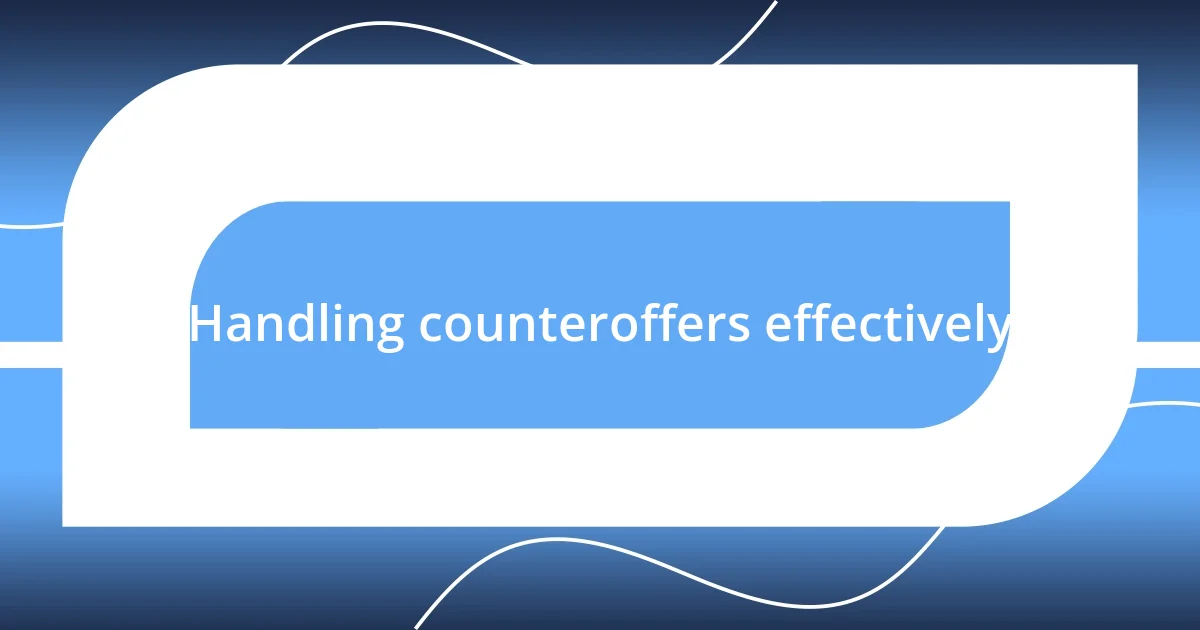
Handling counteroffers effectively
When I received a counteroffer once, I realized how crucial it is to pause and reflect before responding. My initial excitement quickly turned into uncertainty as I contemplated not just the numbers but what the offer meant for my long-term career path. I find it helpful to assess whether the counteroffer aligns with my personal and professional goals, rather than making a snap decision based solely on salary. Have you ever found yourself agreeing to something impulsively, only to regret it later?
Another aspect I’ve learned is that maintaining composure during this stage is vital. In one instance, I was tempted to negotiate further out of sheer adrenaline, but I took a moment to breathe and evaluate the entire package. This approach not only kept the discussion friendly but also allowed me to present a thoughtful counter—showing that I valued the offer while still advocating for my worth effectively. How do you keep your cool when things get heated in negotiations?
Lastly, I’ve discovered that expressing genuine appreciation for the counteroffer can create a more collaborative atmosphere. After one negotiation, I thanked my employer for their time and consideration, which opened the door for a more constructive discussion about my future prospects. I realized that communicating gratitude doesn’t mean you have to settle; it shows that you’re engaged and eager to find a solution that benefits both parties. Have you ever thought about how small gestures, like gratitude, can have a big impact during negotiations?
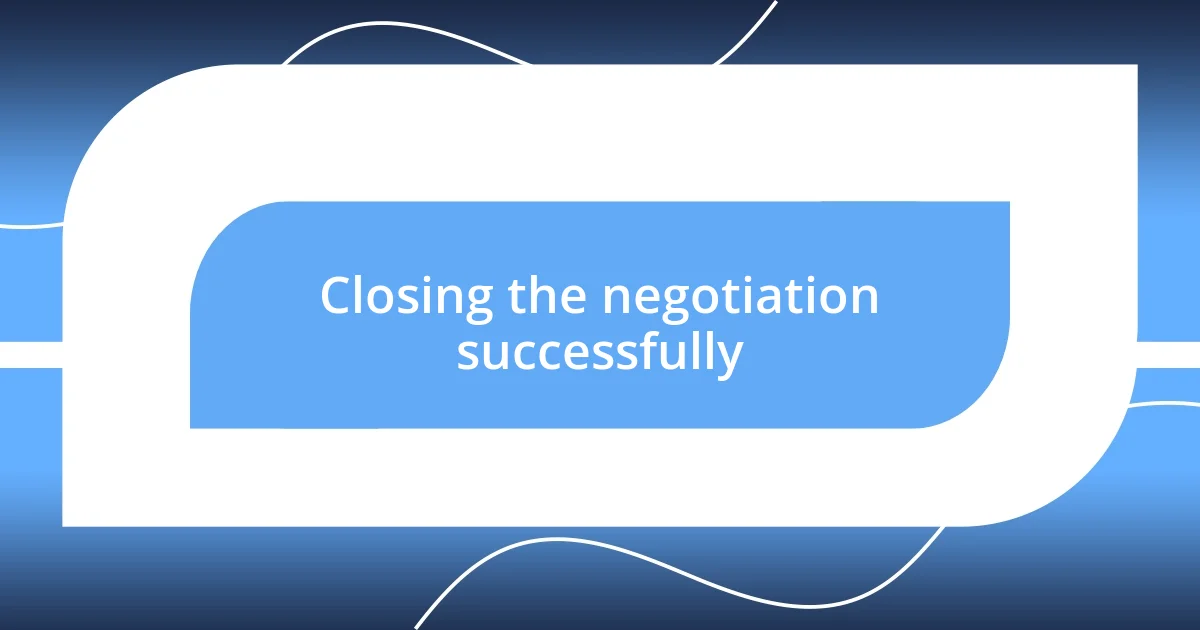
Closing the negotiation successfully
Closing a negotiation successfully often hinges on the final moments of the conversation. I remember a time when I sensed the negotiation was nearing its conclusion. Rather than just agreeing to the terms presented, I expressed enthusiasm about the role and how much I looked forward to contributing to the team. There’s something about that energy—it not only confirmed my interest but also reinforced my value in the eyes of the employer. Have you noticed how a positive tone can shift the atmosphere in negotiations?
As we wrap things up, I believe summarizing the agreed points is essential. After reaching a consensus on salary and benefits, I took a moment to reiterate the key takeaways from our discussion. This not only confirmed that we were on the same page but also demonstrated my attentiveness to the details. Have you ever felt unsure after a conversation? Summarizing can help solidify clarity and leave both parties feeling empowered.
Finally, I’ve found that closing with a confident but humble statement can leave a lasting impression. Once, after securing what I hoped for, I said something like, “I appreciate your willingness to work with me on this. I can’t wait to get started!” It was satisfying to express my gratitude while signaling my eagerness. How do you make sure your final words resonate positively in your negotiations?












